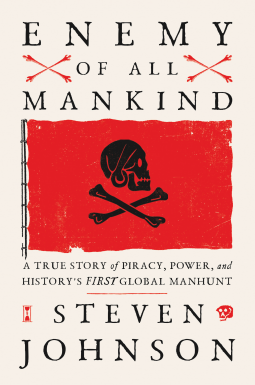
Title: Enemy of all Mankind
Rating: 4 Stars
Ostensibly this was a biography of Henry Every. He was a 17th century pirate. His claim to fame was that he led a mutiny to take over a ship that was due to be used on a Spanish expedition. With a small crew, he embarked on a short career of privacy. It culminated in the capture of a ship named Ganj-i-Sawai. This was a ship owned by the Grand Mughal, the ruler of India. It was loaded with tremendous riches, thus making Every possibly the richest pirate to have ever lived. Unlike some of his shipmates, Every was never caught. It is unknown how long he lived or how he lived. Did he lose all of his money and die in poverty or did he live a quiet life of easy comfort? No one knows.
That was the essential challenge with this book. Other than the very limited period between 1693 and 1696, virtually nothing is known of Every. Therefore, it’s a pretty tall order to fashion a biography from such thin material.
Knowing that he did not have enough material for a conventional biography, Johnson wisely chose to fill out the rest of the book with the indirect impacts piracy had on seemingly unrelated parts of history.
Let’s start with the East India Company. Before it rose to prominence, it was one trader among many in India. Such countries as Portugal and The Netherlands also had a trading presence. The English did not have any significant claim upon Indian trade.
In fact, compared to India, the European countries were fairly small potatoes. The Indian products, particularly its spices and its colorful cotton calico, were in high demand. The Indians weren’t particularly interested in European products, so ships would come from Europe laden with gold and would leave with spices and calico. Unfortunately, the Indians didn’t make much use of this trade imbalance, choosing to use precious metal as ornamentation instead of as an investment.
When the Indian ship was pirated, the Grand Mughal was outraged. He imprisoned all of the East India Company employees and threatened to cut off the trade with England.
While imprisoned, an East India Company employee had a brilliant idea. Under the guise of appeasing the Grand Mughal, the East India Company agreed to protect all ships coming to or from India from privacy. By agreeing to this seemingly benevolent gesture, the Grand Mughal essentially made the English India’s preferred trading partner. Over a span of decades, the English used this position to gain an ever larger share of Indian business and government. Eventually, the English ruled over all of India.
If it wasn’t for that one act of privacy, the English might never have had another opportunity. Considering how broad of an influence the English had over the world, it’s pretty incalculable how big of an impact this had on global history.
No other effects from pirates rise quite to that level, but I found them interesting all the same.
One form of music that I find weirdly fascinating are the so called murder ballads. These are mournful songs that, at least in the US, are relatively common in country music. They are songs that are usually about a man brutally (with sometimes graphic depictions) murdering a woman, getting caught, sentenced, and condemned to die. Often the song is sung from the perspective of the man on death row. Examples of such macabre songs include Tom Dooley, Knoxville Girl, and Pretty Polly. I’d even throw in Johnny Cash’s Cocaine Blues here.
To me, it’s such an odd genre. Why would you sing a song about murder from the perspective of the murderer?
Well, this goes back to a time before people were broadly literate. Before a public execution, poets would write a song about the crime committed. They would publish it as a broadsheet. Balladeers would sing the song while walking among the crowd waiting for the execution. It was a source of entertainment that went along with the actual staging of the execution.
Pirates, being some of the original romantic figures of what at the time would be considered to be true crime, were often the sources of such ballads.
I also found interesting the nature of pirate government. If that seems somehow paradoxical, it really isn’t. After all, the pirates were risking their lives for an uncertain reward. By definition, if you were a pirate, that would seem to imply that you would not shy away from a certain amount of violence. How do you keep order on such a ship?
To keep all sailors bound together on a pirate ship, the ships often created a charter. That charter was actually very democratic. Ship captains were elected. During a battle, the captains always led. When not in a battle, all decisions were made democratically. This was true even economically. Every one got an equal share of the bounty. There were only a few exceptions, but even the captain only got a double share. Compare that to modern CEO’s that make some 300 times what the average employee at their company makes. An argument can be made that a pirate ship was one of the first and, even now, most democratic governments ever formed.
All of that to say that while I did not find the biography of Henry Every very compelling, I did find myself thinking a bit about the pirates’ butterfly effect.